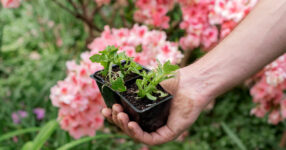
The Health Benefits of Gardening
Last Saturday, I was covered in dirt, my back ached, the scream of a trillion cicadas rang in my ears, and, despite my best efforts, a sunburn was developing on the back of my neck.
I was in heaven.
Over the course of the day, I planted my summer haul of annuals (a riot of reds, purples and yellows), transplanted some fall-blooming mums and pulled a Montauk daisy that had grown too big for the space. A neighbor took the daisy off my hands, and in return gifted me some iris and lamb’s ear that he needed to thin out of his yard.
For me, gardening is a workout, meditation and opportunity to socialize with my neighbors all rolled into one. And while I’m admittedly biased, research backs up some of my observations that gardening can have real benefits for your mind and body.
Gardening gets you moving.
Shoveling mulch, pulling weeds and lugging around a watering can all qualify as moderate-intensity physical activities. And gardeners tend to report higher levels of physical activity overall, compared with non-gardeners.
In one recent study conducted in Colorado, for example, people who joined a community garden logged nearly six extra minutes a day of moderate-to-vigorous physical activity compared with people who were on the waiting list for a plot. That may not sound like a lot, but it added up to about 42 extra minutes per week, said Jill Litt, a professor of environmental health at the University of Colorado at Boulder, who ran the trial.
“That’s almost 30 percent of the way to meeting the federal recommendations” of 150 minutes of moderate-intensity physical activity per week, Dr. Litt said. “People talk about it as a way to meet these goals and be more active but not having to get on a treadmill.”
There is also some evidence that gardeners, possibly because of this increased activity, have better cardio-metabolic health. One study of older adults found that, compared with those who don’t exercise, people who gardened as one of their main physical activities had lower rates of heart attack, stroke, diabetes, high cholesterol and high blood pressure.
Some of the more vigorous gardening activities, like digging, raking and hauling bags of potting soil, can also serve as a strength workout, challenging muscles in the arms, legs and core.
Not every study shows physical health benefits from gardening, though, especially when the activities are lower intensity or done for just 10 or 15 minutes at a time. It’s also possible that people who choose gardening as a hobby are healthier and more active than non-gardeners even before they dig in.
Gardening does wonders for your mental well-being.
Some studies report that working in a garden lowers people’s scores on anxiety and depression measures; other research has found increased confidence and self-esteem among gardeners. In one small study, spending 30 minutes gardening lowered levels of the stress hormone cortisol.
Experts think there are a few possible ways gardening improves mental health. First, physical activity itself is a well-established way to boost mood.
Many people also report feeling a sense of meaning and purpose when they garden, which is an important contributor to well-being.
“Working with plants, people kind of see where they fit in the world,” said Emilee Weaver, the program manager of therapeutic horticulture at the North Carolina Botanical Garden. “They see why they’re valuable because of the cause-and-effect relationship that plants so visibly articulate.”
In addition, gardening, especially in community or allotment gardens, can help people build social connections and combat loneliness. In the Colorado study, participants talked about the relationships they developed and said they felt more bonded to their community through gardening.
“They’re fostering social connection. They’re getting more involved,” Dr. Litt said. “They talk about sense of belonging. They talk about shared learning. All of these processes are really important for mental health.”
If you garden at home, putting a bed in the front yard instead of the back could similarly spur conversation and bring together neighbors, she added.
It’s possible that the act of getting your hands dirty could have a positive effect on your mood, as well. There is some research to suggest that bacteria in soil can alter the microbiome in a way that reduces stress and inflammation.
If playing in the dirt isn’t your thing, just being outdoors in a natural environment can provide stress relief and help people recover from mental fatigue, said Carly Wood, a senior lecturer in sport and exercise science at the University of Essex in England, who researches the mental health benefits of nature-based interventions, including gardening.
That may be because being in nature activates the mind and senses in a way that takes your attention off other things. “Natural environments are fascinating,” Dr. Wood said. “All their features inherently engage us and kind of distract us, in a way, from our stressors.”
And you don’t need to spend all day outdoors to reap the benefits, she said. “Five minutes is enough to improve your self-esteem and your mood.”



